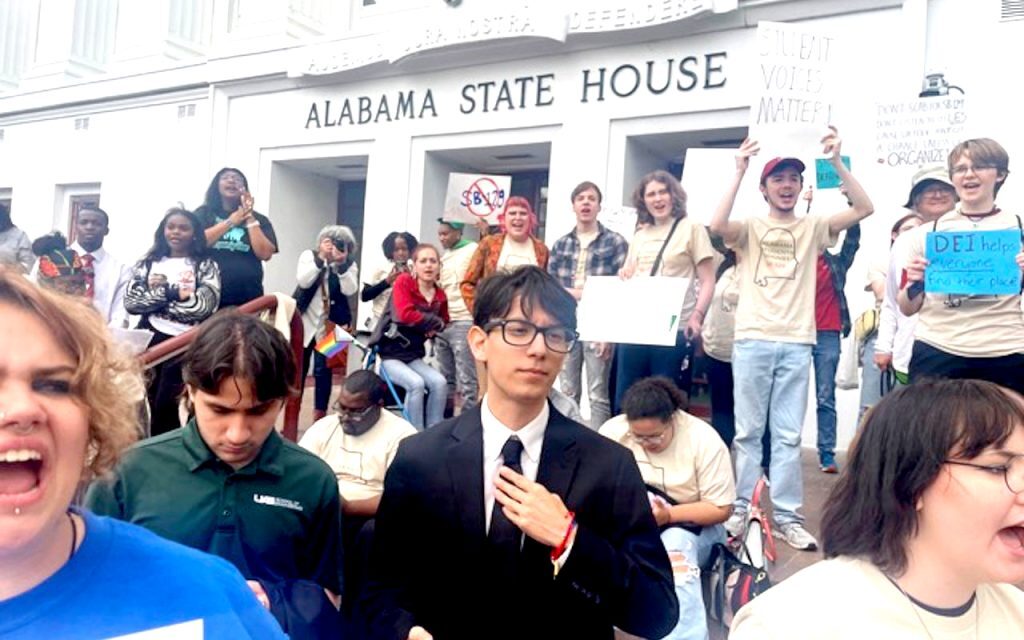By Rebecca Griesbach
As freshmen thumbed through dorm posters and shopped for school supplies at the University of Alabama’s student center during the first week of school, other spaces in the building were noticeably empty.
References to “diversity” have been scrubbed from office name plates. All signage had been removed from the once-bustling Black Student Union office. The former Safe Zone Resource Center, formerly filled with books, Pride flags and portraits of LGBTQ trailblazers, is now just an ordinary conference room.
The offices have been closed and “will not be relocated,” according to the university.
“We are saddened by this loss – not just of a physical space, but of a place where we have gathered, shared, and built a community rooted in our shared experiences, struggles, and triumphs,” BSU President Jordan Stokes wrote in a statement on Instagram Wednesday. The organization was established in 1968.
“Our office was more than just four walls; it was a haven for all of us, a place where we could be ourselves, support one another, and celebrate our culture and heritage.”
The changes stem from a state law, signed by Gov. Kay Ivey in March, that stops state institutions and universities from using public funding for diversity, equity and inclusion offices, or for any DEI programming that advocates for a so-called “divisive concept.”
“I refuse to allow a few bad actors on college campuses – or wherever else for that matter – to go under the acronym of DEI, using taxpayer funds, to push their liberal political movement counter to what the majority of Alabamians believe,” the governor told media in March, and reiterated again to AL.com in August.
The law takes effect Oct. 1. Alabama now joins Texas and Florida, which also have strict anti-DEI laws aimed at state colleges. In those states, some student support programs also have been rolled back.
So far, six Alabama universities have announced plans to dissolve diversity departments, impacting roughly 50 employees. Some eliminated the offices entirely, leaving staff to apply for open positions elsewhere. At University of Alabama System campuses, former DEI staff have moved to new offices, which will focus on “access” and “engagement.”
In response to questions, University of Alabama System representatives said officials at the three campuses will continue to “serve and provide supportive resources to all campus community members” as they work to become fully compliant with the law.
But some students say that hasn’t been the case.
And for much of the summer, they have awaited more answers about which services would stay, and which ones would go. As students return to class, many questions remain.
“There’s so many unknowns that it’s almost terrifying in a way, because nobody knows exactly how this is going to go,” said Neph Irvin, a junior at the University of Alabama at Huntsville, as they prepared for move-in this month.
‘Losing an asset’
In January, student journalist Brychelle Brooks covered the 60th anniversary of Auburn’s integration. Student Harold Franklin attended classes for a year in 1964, before leaving for another university that would support his research.
Brooks wrote for The Auburn Plainsman that President Christopher Roberts was “proud of the steps this institution has made” in terms of diversifying the campus; the college, like others across the state, had expanded its DEI office in recent years.
But by the end of the school year, she said his tone changed.
“The week that the bill was passed, he sort of backtracked and said we were going to follow it no matter what legislation was passed,” she said.
This month, Auburn closed its Office of Inclusion and Diversity and reassigned staff. A news statement said leaders “remain resolute in our commitment to deliver exceptional experiences and to support all students, with particular emphasis on providing access and opportunity.” Today, Auburn remains the least racially diverse public university in Alabama.
Just 5% of Auburn’s students are Black – a percentage that has shrunk in the past decade. Hispanic students make up 4% of the population, and Asian students make up 3%. Brooks said she rarely has a class where she isn’t the only student of color in the room.
A spokesman for the university did not respond to a request for comment about any new plans to improve those metrics, services impacted or additional guidance shared with students and staff.
Drake Pooley, a graduate who was involved in some of the college’s early diversity efforts, is now an investment manager who, while in graduate school, spent several months examining higher education funding in Alabama.
He said Auburn’s lack of diversity could be helped by directing funding toward needs-based scholarships, data-driven programs and targeted outreach, rather than tearing down an office that costs a just fraction of the campus’s operating budget.
“Everybody treats problems nationally nowadays, and so they see what’s happening at Berkeley, and they think that that’s happening at Auburn,” he said. “And these are two different worlds.”
A year after campuses across the state celebrated progress made since the first students successfully integrated the University of Alabama, the University of North Alabama and Auburn, some universities scrubbed links to student scholarships, retention programs and faculty affinity groups, among other offerings.
An AL.com review found that at least 30 resources formerly provided by UA System campus DEI offices are no longer accounted for on university websites.
The University of Alabama removed references to “diversity” and “equity” from its strategic goals and has shifted some retention and enrollment efforts to focus more on students’ class than their race, AL.com found. The university also appears to have deleted its diversity plan altogether.
UA DEI Changes
The University of Alabama’s former Intercultural Diversity Center sports a new name as students prepared for their first week of classes on Aug. 19, 2024. The change was the result of a state law banning diversity offices and some DEI programming. AL.com / Rebecca GriesbachRebecca Griesbach
In response to questions about those changes, officials at each of the three UA System campuses provided the same response in July:
“Initiatives, programs and responsibilities across campus that do not comply with applicable new law will be discontinued or modified,” the statement read. “Beyond the announced closure of the DEI office, it is premature to comment on other programs as compliance efforts are ongoing. Officials are in the process of meeting with individuals regarding impacted areas and working with them to implement necessary changes to ensure compliance.”
By the beginning of the school year, as campuses began to give guidance to students and organizations, the situation didn’t become much clearer.
Funding cuts
Different campuses have made different changes, but one impact has been clear: Less funding for student organizations working on racial diversity, LGBTQ support and multicultural education.
Miguel Luna, a junior at UAB, serves on the student government, where students are working to find out how to support a number of student organizations that have recently lost university funding.
His own organization, Esperanza, was originally founded to improve retention rates of Hispanic students, which make up about 6% of the student population. In his role, he has been able to connect students with internships and raise awareness of issues that affect the school’s growing Hispanic community.
Esperanza, like many student groups, also relied on some funding and partnerships through the school’s DEI office to host events and programs. Now, Luna says, he thinks he will have to find hundreds of dollars to cover food and travel for upcoming events.
“These programs are supposed to be for improving retention and graduation rates, and trying to provide more opportunities for people to take their rightful seat at the table,” he said. “But with these programs gone, I think we’re going to start seeing communities that have begun to heal start to get more hurt.”
Bryce Schottelkotte, a senior who leads the University of Alabama’s Queer Student Association, is bracing for change, too.
She spent much of her free time this summer trying to cobble together funds from outside organizations – money that was once provided by the university – to put on “Shantay, UA,” a welcome event for LGBTQ freshmen. She estimated it cost at least $2,500 last year to cover food and performers for the event.
For a time, students hoped that Safe Zone would remain open as a meeting space for LGBTQ students.
But Safe Zone, as it used to be, is gone.
“University funds will not be used to continue programs offered at Safe Zone,” spokeswoman Alex House said. “Student employees previously assigned to Safe Zone were offered other opportunities, and the staff role in Safe Zone had been vacant and will not be filled.”
So Schottelkotte is preparing her unpaid, student-led group to fill in the gaps.
“It sucks that this is something that we’re all having to deal with,” she said. “And it sucks that stuff that we fought for for so long in Alabama – having a DEI office, having a Safe Zone, having organizations for queer people, organizations for minorities – now all of that is slowly going away.”
Even before the new law, some have struggled to get answers about LGBTQ support services at the university. For years, it has been unclear whether the Safe Zone Emergency Fund, which was set up by the college’s LGBTQ Alumni Association, could be accessed by students.
The alumni group made about $3,000 in initial donations to the fund in 2022 to help support students suddenly cut off from family support or who had other urgent financial needs. But emails reviewed by AL.com show that the former DEI office delayed the fund’s opening for nearly two years.
Schottelkotte said staffers recently assured her that the fund will not disappear, and that it will remain anonymous and accessible for queer students. She’s hopeful that other questions will clear up as the fall semester begins.
She is part of a student advisory board created last spring to provide student input on the university’s DEI changes. She said so far, administrators have been receptive to several of her concerns.
“I do believe that there are many people inside the university that are just as frustrated as us, and want to see these programs continue just as much as we do,” Schottelkotte said. “It’s just very, very, very difficult when your hands are tied and you don’t know what the rope looks like.”
‘Hands are tied’
Beyond funding changes, students say it’s also hard to know if their organizations and major projects can continue.
Last spring, Sean Atchison spent his last two weeks of classes at the University of Alabama scrambling to make sure that Lavender Graduation, a ceremony for LGBTQ graduates, could still go on. Atchison is former president of the college’s Queer Students Association, which was founded decades ago.
A University of Alabama student holds a sign during a protest Wednesday, Feb. 28, 2023, in Tuscaloosa, Alabama. The protest opposed a bill in the Alabama legislature that would ban and end funding for certain diversity, equity and inclusion programming in state agencies and colleges. Rebecca Griesbach/AL.com
A University of Alabama student holds a sign during a protest Wednesday, Feb. 28, 2024, in Tuscaloosa, Alabama. The protest opposed a bill in the Alabama legislature that would ban and end funding for certain diversity, equity and inclusion programming in state agencies and colleges. Rebecca Griesbach/AL.comRebecca Griesbach
The university’s DEI office, he said, usually helped plan the event and provided staff to help with the setup. But over the past year, the Queer Students Association was left on their own to plan and fund several of its trademark events, he and others told AL.com this summer. Alumni stepped in to help.
Those events were “life-bringers,” Atchison said, that provided a space for LGBTQ students to celebrate their accomplishments, create traditions and quell anxiety. Former staff at Safe Zone also were vital; Atchison said they helped him through a traumatic experience and connected him with campus resources.
Now, the institutional support that made those programs possible has evaporated.
“From what I can tell, our community has been eliminated entirely,” he said.
The University of Alabama interprets the legislation to mean that not only is public funding gone, the school cannot promise campus space or employees toward diversity efforts. If affinity groups want to meet on campus, they can reserve space for limited times.
“All registered student organizations will continue to have the ability to develop their own programming and reserve meeting or event space in the Student Center and other campus facilities,” the university spokeswoman told AL.com. “If student organizations wish to host or sponsor DEI programs or events that may promote a divisive concept, they must follow the requirements set forth by the law.”
At UAB, a notice replaced a webpage that once housed information about diversity programming and other mentorship and advocacy organizations. Officials were conducting a “comprehensive review” of those programs, the page read.
A university spokeswoman told AL.com that student organizations can continue to receive university funding, but cannot use that money for “discussions or events that may involve ‘divisive concepts’ or for ‘diversity, equity and inclusion programs’ in accordance with the law.”
Sydney Testman, a junior at UAB, was the finance coordinator for the Social Justice Advocacy Council, which helps find diversity programming for other student groups. Testman’s job was to help other student organizations fund multicultural and social-justice oriented programs. Over the years, she’s helped support voting drives, a professional conference and community service work.
She said university officials told her not to do recruiting for the organization before school started.
“Things are changing and we have no idea how they’re changing,” Testman told AL.com in July. “I’m scared I’m going to come back to a completely different campus and have no idea what I’m walking into.”
Then, a couple weeks before school started, Testman was informed that the university was shifting the council from a university-funded group to a registered student organization, responsible for finding its own funding. Testman would lose her role and a $300 semesterly stipend.
“We thank you for all the hard work you’ve put in over this summer and understand that these changes may not align with what you were anticipating for the upcoming year,” a message from the council’s president read. “While we hope that everyone will continue with us on this new path, we understand if you wish to explore other opportunities.”
Some campus students have praised the changes. Alabama’s College Republicans thanked officials for the new law; President Riley McArdle, in a statement, said the group also planned to “monitor efforts to diminish the law on campus.”
Brooks, meanwhile, is still trying to understand how the law will impact Auburn staff and students.
She feels protected by her first amendment rights, both as a journalist and as a member of the Black Student Union, and says that she’s not afraid to continue writing about changes on campus. But she’s worried about how it will impact student and staff morale in the long run.
Some of her professors are already changing their syllabi and course titles, she said. She’s also concerned about the impact of the upcoming November election, and whether students will have a safe place to process the outcome, whatever it may be.
“Students are losing an asset toward their mental health, because when you’re in that office, there’s no difference in anybody,” she said. “You’re all one. You’re accepted. You feel seen.”
Alaina Bookman contributed reporting.











